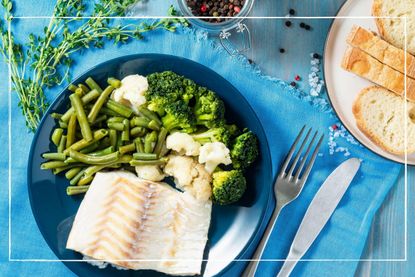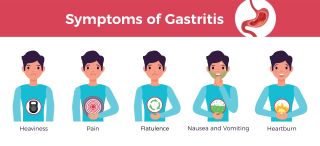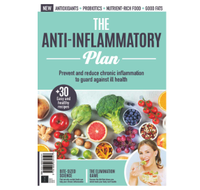The gastritis diet: what are the benefits and what can you eat?
If you suffer from gastritis, you’ll already know that your diet can have a seriously positive (or negative) impact on your condition.


If you suffer from gastritis, you’ll already know that your diet can have a seriously positive (or negative) impact on your condition.
Gastritis is a common condition caused by an inflammation of the stomach lining. It can lead to a number of unpleasant symptoms. These include indigestion, burning stomach pain, being or feeling sick, and suffering from a bloated stomach. Gastritis symptoms can be acute and come on quickly and severely, or chronic and last a long time. However, following a gastritis diet can help to ease or eliminate some of this discomfort.
According to registered dietician Sophie Medlin, gastritis can be triggered by a number of different factors. She says: "It can be caused by alcohol, chronic vomiting, medications like ibuprofen and aspirin and even by stress. A bacteria called H. pylori, as well as other infections can also cause it."
For most people, gastritis will subside after medication, as it’s caused by environmental factors like drinking too much alcohol. These include antacids, which neutralise the acid in the stomach, and proton pump inhibitors (PPIs), which decrease acid production. However, it can also be alleviated by adapting your diet.
Research by the Beijing University of Chinese Medicine has shown that the symptoms of this condition are made worse by foods that are salty, spicy, fried or acidic, as well as sweets and meat. So adopting a gastritis diet, which cuts out some of these foods, can help to reduce or stop symptoms completely. A 2021 study has also found that increasing your intake of anti-inflammatory and probiotic foods can help to reduce inflammation.
What can you eat on the gastritis diet?
When thinking about what you can eat on the gastritis diet, it’s worth remembering that people with the condition report being affected by different foods. There is also a need for further research into the dietary factors of the condition. However, studies have shown that there are some anti-inflammatory foods and probiotics which can help to reduce or relieve symptoms.
Anti-inflammatory foods
Anti-inflammatory foods help to reduce the amount of acid in the stomach which relieves gastritis symptoms, allowing the stomach lining to heal. Including the following anti-inflammatory foods in your diet could help to reduce inflammation:
GoodtoKnow Newsletter
Parenting advice, hot topics, best buys and family finance tips delivered straight to your inbox.
- Berries - Blueberries, strawberries, raspberries,
- Green leafy vegetables - Kale, spinach, cabbage
- Other vegetables - Broccoli, bell peppers, mushrooms, fennel
- Oily fish - Salmon, sardines, anchovies, mackerel, herring
- Unsalted nuts - Almonds, hazelnuts, peanuts, pecans, walnuts and pistachios
- Teas - green tea, Ginger tea, Liquorice tea
- Aloe vera juice
- Extra virgin olive oil
- Spices - turmeric, garlic, ginger
Recommended book:
The Anti-Inflammatory Plan - £9.99 | Amazon
If you know you need to make some lifestyle changes to reduce inflammation, this in-depth guide is a great place to start. Beginning with the science behind the condition, it's packed with advice on reducing symptoms - along with a full diet plan and 30+ easy, healthy, recipes
Probiotic foods
Probiotic foods have also been found to combat bad bacteria that can lead to stomach infections, such as H. pylori. Recent research has shown this to be the most common cause of gastritis - around 60 to 70 per cent. Some studies suggest that probiotics can also help to diminish the frequency of gastrointestinal occurrences. However, more research is needed in this area.
Foods that contain natural probiotics:
- Natural yoghurt
- Sourdough bread
- Kefir (a fermented milk drink)
- Miso ( a fermented paste used for flavour and soups)
- Kimchi (fermented vegetables used as a side dish or for flavourings)
- Sauerkraut (fermented cabbage used as a side dish or for flavourings
- Tempeh (a meat replacement, made from fermented soybeans)
Sophie Medlin, who is director of City Dietitians, says: “In general, people with gastritis need to prioritise medical treatment. However, what you eat can certainly aggravate things further. Good foods to eat when you have gastritis include root vegetables, lower acid fruit like melon and banana, lean meats and fish, white or brown bread (but not seeded), cereals like porridge, pasta, rice, and potatoes.”
Sophie’s suggested meal plan for a day:
- Breakfast - Porridge with lacto-free milk, banana and berries
- Snack - Crackers with hummus
- Lunch - Vegetable soup with bread
- Snack - Melon and grapes
- Dinner - Roasted root vegetables with chicken or fish
Foods to avoid on the gastritis diet
Foods to avoid on the gastritis diet differ from person to person. It is generally agreed that there is still the need for greater research on the relationship between the symptoms and diet of chronic gastritis. However, participants in this 2020 study by Beijing University of Chinese Medicine reported that meats, fried foods, sour foods and salty foods all played a part in their symptoms. This is likely due to the fact that they irritate the damaged lining of the stomach.
Foods that may exacerbate gastritis:
- Acidic foods - tomatoes, oranges, lemons, limes, grapefruits
- Spicy foods - hot chillies, hot curries, hot peppers, hot sauces
- Salty foods - crisps, tortillas, salted nuts, smoked meat or fish
- Meat - particularly red meat, such as beef, lamb and pork or barbecued meat, such as sausages, burgers, kebabs, chops
- Alcohol and caffeine - Beer, wine, spirits, coffee, black tea
Registered dietician Sophie Medlin says: “People who are a healthy weight should try to follow a lower fat, lower fibre diet and exclude alcohol, coffee, spicy food and juices until symptoms settle. “Some people may also benefit from reducing the milk in their diet until they are feeling better. If your weight is low or you already follow a restrictive diet, please book in to see a specialist gastroenterology dietitian or ask for a referral from your GP.”
In addition, to which foods they ate, people in the study also said that the way in which they ate played a part too.
The following factors also triggered gastritis symptoms:
- Eating leftover food
- Eating too fast
- Irregular mealtimes
- Dining in restaurants
What causes gastritis?
Various lifestyle choices and health conditions can cause gastritis. Smoking, drinking excessive amounts of alcohol, bacterial infections and stress are all known contributors to it. The symptoms of gastritis may be acute and come on quickly and severely or chronic and last a long time. Not treating the problem can also lead to stomach ulcers.
According to the NHS gastritis can be caused by factors ranging from a bacterial infection or regularly taking aspirin, ibuprofen or other painkillers, to excessive use of alcohol or cocaine, smoking, or even a stressful event, such as a bad injury, critical illness or major surgery. The following may be causes of gastritis:
Heliobacter pylori (H. pylori) bacterial infection H. pylori is a common stomach infection and does not usually cause symptoms. So many people may not even realise they have it. However, it can also cause inflammation of the stomach lining, which can lead to recurring indigestion. This is often common in older age groups and usually causes chronic long-term cases. There has been some research that has linked high salt intake with H. pylori.
Excessive use of alcohol or cocaine Both excessive alcohol and cocaine use can damage the lining of the stomach, due to an increase in acidity levels. For example, one studywhich looked at 69 males who had been chronically drinking between five and 37 years, found it predisposes the gastric mucosa, the mucous membrane layer of the stomach, to inflammation. Plus, the inflammation was worse due to the duration of the addiction.
Regularly taking aspirin, ibuprofen or other painkillers Studies have shown that when taken for several weeks or months, some medications such as aspirin or ibuprofen can lead to gastritis. This may be the case for people who need to use non-steroidal anti-inflammatory drugs (NSAIDs) for other conditions they may have. NSAIDs are usually used to relieve symptoms ranging from headaches and painful periods to colds and flu. However, long-term conditions, such as arthritis, can also be treated by them.
A stressful event Sometimes a stressful life event, such as a bad injury, critical illness or major surgery can trigger gastritis. Research has shown that stress can lead to increased acid production in the stomach. This can then cause gastritis. Learning how to deal with stress> could help to relieve some of these symptoms.
Gastritis symptoms
Gastritis symptoms can vary in severity, from an occasional annoyance to regular intense pain. Some people will experience acute gastritis, where the pain comes on suddenly and severely, while for others the condition will be chronic and the symptoms will last for a long time. Most people will recover quickly as long as they allow their stomachs to heal properly. However, sometimes stomach ulcers can be caused in cases of erosive gastritis, when the stomach lining has been worn away.
Typical gastritis symptoms include:
- Indigestion
- Burning stomach pain
- Feeling or being sick
- Feeling full after eating
Registered dietician Sophie Medlin says: “Most people will experience stomach pain under their ribs or high in their stomach and some may also get pain between their shoulder blades. You’re also likely to experience nausea, bloating, indigestion, hiccups and loss of appetite. More worrying symptoms would include vomiting up blood which can look like coffee grinds or black tarry stools which is old blood from the stomach.”

Gastritis diagnosis and treatments
There are a number of methods to diagnose gastritis and if you think you have it you should speak to your doctor. As well as adapting your diet, a range of medical treatments are also available.
Registered dietician Sophie Medlin explains: "Most people will get diagnosed by their GP and given a medication called a PPI (proton pump inhibitor) which reduces the acid in the stomach, allowing the lining to heal. If that doesn’t work, you may be referred for an endoscopy. Patients with 'red flag' symptoms like blood in their vomit or stools or weight loss should be referred straight for a camera test."
In order to diagnose gastritis, a doctor may recommend one or more of the following:
- a stool test – to check for infection or bleeding from the stomach
- a breath test for Helicobacter pylori (H. pylori) infection – this involves drinking a glass of clear, tasteless liquid that contains radioactive carbon and blowing into a bag
- an endoscopy – a flexible tube (endoscope) is passed down your throat and into your oesophagus and stomach to look for signs of inflammation
- a barium swallow – barium solution, which shows up on X-rays as it passes through the digestive system, will be given
If a doctor confirms you have gastritis, treatment may include:
- Antacids - These help to neutralise the acid in your stomach. They are available to buy from a pharmacy.
- Histamine 2 (H2) blockers – These decrease acid production. They are available to buy from a pharmacy.
- Proton pump inhibitors (PPIs) – These medicines (such as omeprazole) decrease acid production more effectively than H2 blockers. Some low-doses are available to buy from a pharmacy. Alternatively, GPs can provide prescriptions for stronger doses.
Other things which may help include:
- Eating smaller, more frequent meals
- Giving up smoking
- Finding ways to manage your stress
Video of the Week:

Emily-Ann Elliott is an experienced online and print journalist, with a focus on health, travel, and parenting. After beginning her career as a health journalist at The Basingstoke Gazette, she worked at a number of regional newspapers before moving to BBC News online. She later worked as a journalist for Comic Relief, covering stories about health and international development, as well as The Independent, The i, The Guardian, and The Telegraph. Following the birth of her son with neonatal meningitis, Emily-Ann has a particular interest in neonatal health and parental support. Emily-Ann has a degree in English literature from the University of Newcastle and has NCTJ and NCE qualifications in newspaper journalism.
-
 Why do babies need to lie flat in a pram?
Why do babies need to lie flat in a pram?Wondering why babies need to lie flat? Experts reveal all — plus whether or not a baby should sleep in a pram
By Charlotte Duck Published
-
 The 3 stages of play every parent needs to know to save their sanity (and you're probably nailing #2)
The 3 stages of play every parent needs to know to save their sanity (and you're probably nailing #2)By Dr Amanda Gummer Published

